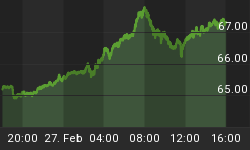As we sit ahead of a future inflation or deflation or both, still to come, we need to understand how gold will perform in these sets of conditions. Much has been written on gold being an inflation hedge but not so much on its value in deflation. But gold is not so easy to slot into a pre-defined category like this. In history it has performed well in several other situations. In uncertainty, whether it has been in wartime, economic uncertainty or simply national uncertainty it has performed well. When confidence in currencies seeps away gold prices in those lands reflect the fall of the currency as it rises.
The major point we will describe in this article is that gold is both an asset and cash at times and will be so in the relatively near future!
What is not understood that well by the markets is that gold does cannot be defined as either an asset or as cash. If one does not understand what gold really is then we will misread gold's performance in the future. For the future we are looking at shows that some if not all the conditions we have just mentioned are headed our way soon.
It is therefore critical that we understand what gold really is.
In the developed world gold is seen either as an asset or a commodity as result of over 40 years of indoctrination by developed world's central banks through programs that have attempted to discredit it. In the last 15 years of last century these attempts succeeded as gold fell from $850 to $275 in 1999. But then reality kicked in as the central banks of Europe, while carefully setting up a program of selling some gold, reaffirmed it as an important reserve asset. Since then the Basel accord on banking has defined it as an asset in central banks as a Reserve Asset, in Commercial bank balance sheets as a Tier 1 Balance Sheet Asset and in other institutional portfolios it is treated as a counter to other assets there and as a 'balancing' asset. In the hands of individual investors it is treated either as a source of either long-term or short-term profits or a long-term, financial-security-providing asset.
The world is divided into two halves when it comes to gold. In the developed world it is seen primarily as asset with even Mr. Ben Bernanke, in front of a Senate Committee, stating that gold was not money. As an asset it has been treated there as a counter to growth and to equities. That explains the performance of gold in the U.S. over the last two years. The sell-off of gold from the U.S.-based gold ETFs has described this perfectly. This has now halted.
When Alan Greenspan wrote his favorable, famous essay on gold well before he became the head of the Fed, he stated that "Gold is money, in extremis". What does that mean? It means that gold is money when times are extreme. When is that? In financial terms it means that it is money when government issued money [currencies] is not functioning as it should.
As we said at the outset, another condition that is "in extremis" is when confidence is lost in a currency by its users. Such extreme conditions come about in wars, currency wars, runaway inflation and runaway deflation. It happens when confidence in an economy and that nation's currency is lost, internationally, too.
We need to emphasize strongly that gold is across the world cash the same as currency, even when currencies are rejected as money. You can take a Peso, a Rand, a Euro to Mongolia and they will not recognize them as money. To those people they are, at best, some foreign government's paper IOU redeemable only in areas that recognize them. But take gold anywhere in the world it is money, even in Mongolia.
The major point you as the reader should take away from this article is that Gold is both an asset and cash. In good times it is an asset. In bad times it is cash. The functioning as one or the other depends on the times we have around us, both locally and internationally.
With the Yuan approaching full convertibility and the status of a global reserve currency, extreme monetary conditions lie just ahead.
In such times gold will facilitate global capital and payment exchanges. That's why China is buying as much as it can now. In time, we expect the rest of the world to take gold wherever and from whomever it can, including its citizens, so that their global monetary interchange is both secured and facilitated by gold in the future.
Yes, this does mean that they will use whatever means they can to take gold from their citizen, including confiscation when the time arrives.
But it means that not only should you hold your gold for the long-term, you should hold it in a way that will protect you from confiscation by your government and leaving you out of harm's way.
Hold your gold in such a way that governments and banks can't seize it!
Visit: www.stockbridgeMgMt.com And Enquire @ admin@StockbridgeMgMt.com















